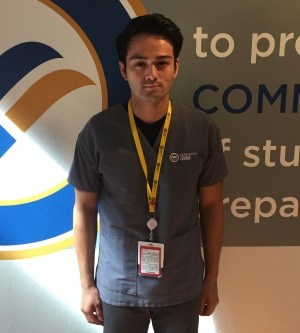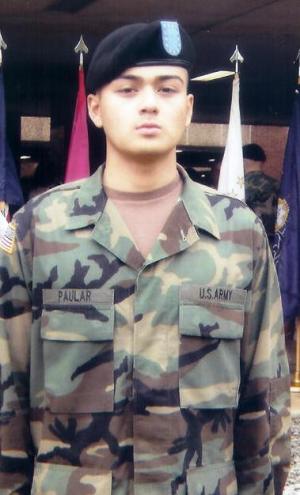Respiratory Care Spotlight – Meet James Paular
 James Paular, 30, is studying to become a respiratory therapist at our Pleasant Hill, CA, campus. He started the Associate of Science degree program in Respiratory Care in February 2013, and hopes to earn his degree in February next year.
James Paular, 30, is studying to become a respiratory therapist at our Pleasant Hill, CA, campus. He started the Associate of Science degree program in Respiratory Care in February 2013, and hopes to earn his degree in February next year.
James, a U.S. Army veteran, was recently named as a recipient of the Imagine America Foundation 2014 LDRSHIP Awards.
Thank you for your time James. What made you choose a career in respiratory care?
I knew I wanted to do something in the health care field. At first I was headed toward nursing; I went to a junior college (JC) for a while, but with all the waiting lists it was taking forever. My wife has a friend who’s a respiratory therapist so we talked about what he did in the hospital, and that got me interested.
I went back to the JC and started taking classes towards becoming a respiratory therapist, but that program also had a waiting list and lots of prerequisites. Some of the prerequisites had prerequisites! I felt like I was wasting time. It was all just taking too long, I guess I wasted about six years between the two programs. That’s when I reached out to Carrington College again.
Reach out again? Had you visited Carrington before?
Yes, my biggest regret is not doing this sooner. I first visited Carrington years ago when I started thinking about respiratory, but at the time I was put off by the tuition fees. I went back to the JC and ended up wasting more time. If I knew then what I know now about the financial aid options, I would have made a different choice. I may have graduated and be well into my career as a licensed respiratory therapist.*
Tell me more about the Imagine America Foundation Award?
 A staff member at the campus gave me some information about the foundation and their LDRSHIP Award. It wasn’t something I’d heard of before, so it was a nice surprise to get a $500 grant towards my tuition.
A staff member at the campus gave me some information about the foundation and their LDRSHIP Award. It wasn’t something I’d heard of before, so it was a nice surprise to get a $500 grant towards my tuition.
The program is designed to help veterans who continue their education at a career college. There are criteria you have to meet to be able to apply; you need to attain certain academic and attendance standards, you need letters of recommendation, you have to write a couple of papers and so on.**
What’s the most interesting thing you’ve learned at Carrington so far?
Honestly I didn’t know how important respiratory therapists are. There are many different positions in a hospital, but respiratory therapists really work closely with the doctors and nurses. Doctors may turn to therapists for advice based on their assessment. I was glad to see the respect there is for the field. You’re not a technician, you’re actually a therapist. There is critical thinking involved, you’re assessing patients, and you’re making a real difference. I was also amazed to learn how the lungs work hand-in-hand with the heart; I now know why they refer to it as Cardiopulmonary.
So you discovered that importance as you progressed on the program?
I did. I guess I kind of had an idea when I started, but it really motivated me more when I discovered what a valuable part of the team we are. During the program I’ve developed a much better appreciation of what a respiratory therapist provides for a patient, and for the hospital. I’m so glad I chose respiratory care. The work is very different to nursing; we just deal with the upper body, while nurses have to deal with the whole body if you know what I mean!
You’ve been out on rotations during the program, what’s that like?
I love the adrenalin rush that comes from working in the emergency room; in my clinical rotations I’ve already had to assist in emergency situations. You’re right there you know, in the middle of it all when the patient comes in. The respiratory therapist is right there with the nurses and doctors.
What the most interesting thing you learned about yourself at Carrington?
I’ve learned that I can miss parties, be without my family, and handle non-stop studying. I’ve been working closely with other students as we try to help each other through the program. I’ve amazed myself that I can take a leadership role in study groups, or take a back seat and learn from someone else. In the military you go by rank, you take orders. In this program, there’s no age limit, there’s no rank. We have people age 40, and people age 18 just out of high school, but we’re all equal. It’s that respect that we have for each other that means we can all learn from each other.
What’s the biggest thing you want to change about yourself during the program?
To be honest I’m not a great social speaker. Coming to school, doing presentations, working with students, working with patients is helping me improve my confidence. It’s important to be able to project confidence to patients and coworkers.
So you’re in the home stretch!
Yes, we’re almost there! It’s exciting. All we have left are a couple of classes, our review and some more hands-on training. My last two months of clinical rotation start in November. Hopefully I can impress them enough to get hired!
Where do you want to be in three years?
I’d love to work in a hospital, and I want to take my education further. I’m still young enough to handle the pace and stress of the emergency room. I’d love to build up my experience in that kind of environment and help save lives. Eventually I’d like to get a master’s degree in Respiratory Therapy.
Tell me about your support network.
My whole family has been very supportive; they understand that if I can’t make it to a party or can’t attend an event it’s because I’m studying. I’ve been working part-time as a rehab aid at a nursing home, but my wife, Katrina, has really been supporting us, paying the bills. My family has been helping out with that too. I couldn’t have done this without Katrina, and my mom and dad. My mom, Gina, is the one I really have to thank; she’s been pushing me to get into health care since I got out of the army eight years ago.
When I got out I was going to get a job I could transition into easily, maybe something with the post office. But my mom kept telling me that I had to get back to school to get a career. She was so excited when I told her about respiratory care, because she knew I’d been so discouraged by my experience with the nursing program at the junior college.
Is there anything you wish you’d known on day one at school, any advice for new students?
I wish I’d known the real sacrifice of time required. It’s all about managing your time. If you’re considering the Respiratory Care program, make sure you really want to do this. Everything else will pretty much be on hold. If this is what you really want, you have to make some sacrifices. Don’t get discouraged or overwhelmed in the first few weeks because you’re not alone; instructors, the staff in the Student Success Center, everyone on campus wants to see you succeed.
They tell you it’s an accelerated program, but you definitely have to become an accelerated learner. Try to pick things up quickly, and take great notes because you won’t learn all the subject matter in class, you’ll have to do it at home too. I print out and re-read every PowerPoint; I even search out videos on YouTube to help me understand certain things. To be successful and maintain good grades, you’ll have to rise to the program. But once you learn to manage your time and get settled into study groups, it won’t seem so bad.
*Carrington College prepares students to take appropriate certification and licensure exams related to their individual majors. The Colleges do not guarantee students will successfully pass these exams or be certified or licensed as a result of completing the program.
**The LDRSHIP Award, from The Imagine America Foundation, offers grants toward college tuition to active duty, reservist, honorably discharged or retired U.S. military veterans attending a participating Imagine America institution. See www.imagine-america.org/ldrship for details.